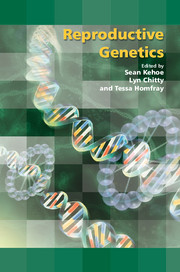Book contents
- Frontmatter
- Contents
- Participants
- Declarations of personal interest
- Preface
- 1 Genetic aetiology of infertility
- 2 Disorders of sex development
- 3 Preimplantation genetic diagnosis: current practice and future possibilities
- 4 Ethical aspects of saviour siblings: procreative reasons and the treatment of children
- 5 Epigenetics, assisted reproductive technologies and growth restriction
- 6 Fetal stem cell therapy
- 7 Prenatal gene therapy
- 8 Ethical aspects of stem cell therapy and gene therapy
- 9 Fetal dysmorphology: the role of the geneticist in the fetal medicine unit in targeting diagnostic tests
- 10 Fetal karyotyping: what should we be offering and how?
- 11 Non-invasive prenatal diagnosis: the future of prenatal genetic diagnosis?
- 12 Non-invasive prenatal diagnosis for fetal blood group status
- 13 Selective termination of pregnancy and preimplantation genetic diagnosis: some ethical issues in the interpretation of the legal criteria
- 14 Implementation and auditing of new genetics and tests: translating genetic tests into practice in the NHS
- 15 New advances in prenatal genetic testing: the parent perspective
- 16 Informed consent: what should we be doing?
- 17 Consensus views arising from the 57th Study Group: Reproductive Genetics
- Index
17 - Consensus views arising from the 57th Study Group: Reproductive Genetics
Published online by Cambridge University Press: 05 February 2014
- Frontmatter
- Contents
- Participants
- Declarations of personal interest
- Preface
- 1 Genetic aetiology of infertility
- 2 Disorders of sex development
- 3 Preimplantation genetic diagnosis: current practice and future possibilities
- 4 Ethical aspects of saviour siblings: procreative reasons and the treatment of children
- 5 Epigenetics, assisted reproductive technologies and growth restriction
- 6 Fetal stem cell therapy
- 7 Prenatal gene therapy
- 8 Ethical aspects of stem cell therapy and gene therapy
- 9 Fetal dysmorphology: the role of the geneticist in the fetal medicine unit in targeting diagnostic tests
- 10 Fetal karyotyping: what should we be offering and how?
- 11 Non-invasive prenatal diagnosis: the future of prenatal genetic diagnosis?
- 12 Non-invasive prenatal diagnosis for fetal blood group status
- 13 Selective termination of pregnancy and preimplantation genetic diagnosis: some ethical issues in the interpretation of the legal criteria
- 14 Implementation and auditing of new genetics and tests: translating genetic tests into practice in the NHS
- 15 New advances in prenatal genetic testing: the parent perspective
- 16 Informed consent: what should we be doing?
- 17 Consensus views arising from the 57th Study Group: Reproductive Genetics
- Index
Summary
Keywords
- Type
- Chapter
- Information
- Reproductive Genetics , pp. 217 - 220Publisher: Cambridge University PressPrint publication year: 2009

